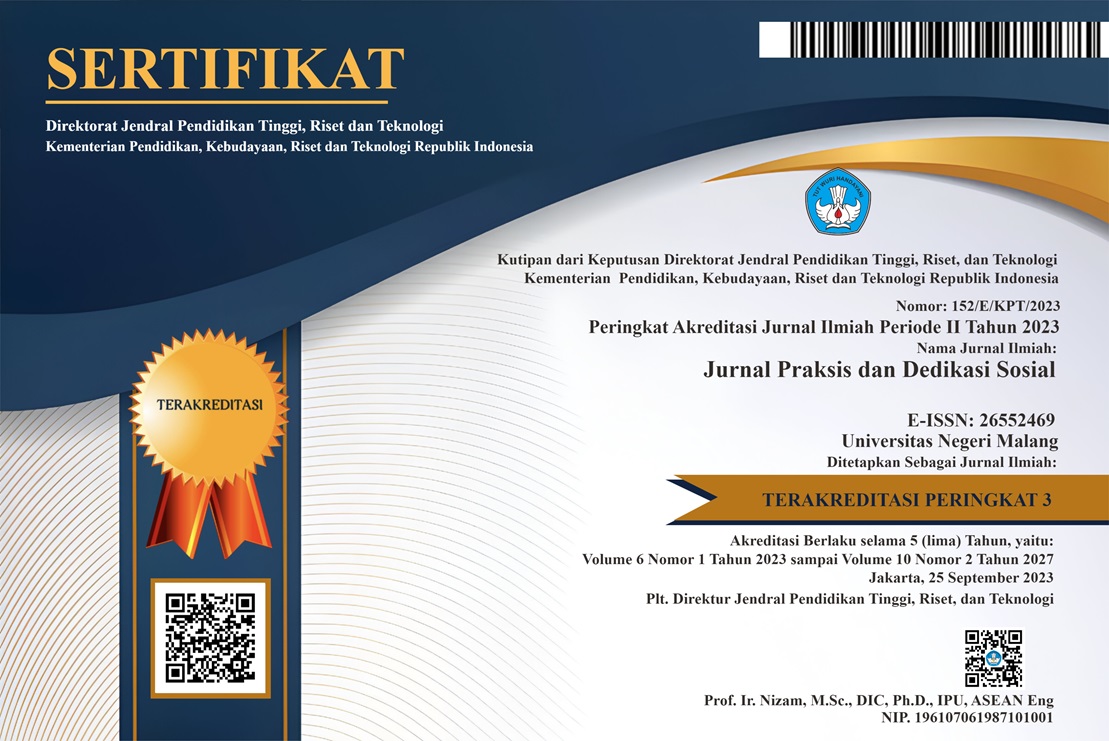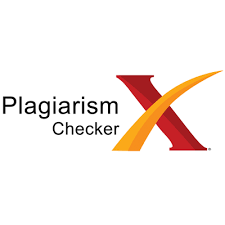PENGARUH DIGITAL LEARNING AND DIGITAL GAMES TRAINING TERHADAP KOMPETENSI TECHNOLOGICAL PEDAGOGICAL CONTENT KNOWLEDGE GURU SMA
Abstract
The development of digital technology requires teachers to present a sustainable learning process without the limitations of space and time. The presentation of digital learning provides opportunities for students to prepare for work competencies in the 21st Century and provides learning experiences that generate enthusiasm and a positive learning environment for students. This study aims to reveal the effect of digital learning and digital games in education training on the technological pedagogical content knowledge of teachers at SMAN Kepanjen Malang Regency. This type of research is experimental research packaged in a training program with pretest and posttest to measure the competence of TPACK teachers. The implementation method is carried out in stages, namely (1) needs and situation analysis, (2) program socialization and training implementation, (3) evaluation. The research subjects were SMAN 1 Kepanjen teachers with different scientific backgrounds. The analysis in this study used the N-gain score test, which was carried out by calculating the difference between the pretest and posttest scores. The training facilities use gamification media and the Learning Management System (LMS). The results of this training influence knowledge, competence, and capability related to technological pedagogical content knowledge. This is because teachers are getting used to and taking advantage of modern features in the LMS, namely user management, course management, forums, lessons, big blue buttons, and others.
Perkembangan teknologi digital menuntut guru untuk menghadirkan proses pembelajaran yang berkelanjutan tanpa batasan ruang dan waktu. Penyajian pembelajaran digital memberikan kesempatan kepada siswa untuk mempersiapkan kompetensi kerja di abad 21 dan memberikan pengalaman belajar yang membangkitkan semangat dan lingkungan belajar yang positif bagi siswa. Penelitian ini bertujuan untuk mengungkapkan pengaruh pembelajaran digital dan permainan digital dalam pelatihan pendidikan terhadap pengetahuan konten pedagogik teknologi guru di SMAN Kepanjen Kabupaten Malang. Jenis penelitian ini adalah penelitian eksperimen yang dikemas dalam program pelatihan dengan pretest dan postest untuk mengukur kompetensi guru TPACK. Metode pelaksanaan dilakukan secara bertahap, yaitu (1) analisis kebutuhan dan situasi, (2) sosialisasi program dan pelaksanaan pelatihan, (3) evaluasi. Subjek penelitian adalah guru SMAN 1 Kepanjen dengan latar belakang keilmuan yang berbeda. Analisis dalam penelitian ini menggunakan tes skor N-gain yang dilakukan dengan menghitung selisih skor pretest dan postest. Fasilitas pelatihan menggunakan media gamifikasi dan Learning Management System (LMS). Hasil pelatihan ini mempengaruhi pengetahuan, kompetensi, dan kapabilitas terkait dengan technological pedagogical content knowledge. Hal ini karena para guru mulai terbiasa dan memanfaatkan fitur-fitur modern di LMS, yaitu manajemen pengguna, manajemen kursus, forum, pelajaran, tombol biru besar, dan lain-lain.
Keywords
Full Text:
PDFReferences
Abu Bakar, M. A., & Ismail, N. (2020). Exploring students’ metacognitive regulation skills and mathematics achievement in implementation of 21st century learning in Malaysia. Problems of Education in the 21st Century, 78(3), 314–327. https://doi.org/10.33225/¬pec/20.78.314
Agustini, K., Santyasa, I. W., & Ratminingsih, N. M. (2019). Analysis of competence on “tPACK”: 21st century teacher professional development. Journal of Physics: Conference Series, 1387(1). https://doi.org/10.1088/1742-6596/1387/1/012035
Ahmed, A. K., & Ain, A. (2013). Teacher-centered versus learner -centered teaching style. The Journal of Global Business Management, 9(1), 12.
Al-Kandari, A. M., & Al-Qattan, M. M. (2020). E-task based learning approach to enhancing 21st-century learning outcomes. International Journal of Instruction, 13(1), 551–566. https://¬doi.org/¬10.29333/iji.2020.13136a
Bonfield, C. A., Salter, M., Longmuir, A., Benson, M., & Adachi, C. (2020). Transformation or evolution?: Education 4.0, teaching and learning in the digital age. Higher Education Pedagogies, 5(1), 223-246. https://doi.org/10.1080/23752696.2020.1816847
Bullock, S. M. (2013). Using digital technologies to support self-directed learning for preservice teacher education. Curriculum Journal, 24(1), 103-120. https://doi.org/10.1080/¬09585176.¬2012.¬744695
Cremin, T., Glauert, E., Craft, A., Compton, A., & Stylianidou, F. (2015). Creative little scientists: Exploring pedagogical synergies between inquiry-based and creative approaches in early years science. Education 3-13, 43(4), 404-419. https://doi.org/10.1080/¬03004279.¬2015.¬1020655
Essi, N. O., Rossi, P. H., & Freeman, H. E. (1987). Evaluation: A systematic approach. The Statistician, 36(4). https://doi.org/10.2307/2348859
Ewell, P., Paulson, K., & Kinzie, J. (2011). Down and in: Assessment practices at the program level. National Institute for Learning Outcomes Assessment.
Hill, H. C., Ball, D. L., & Schilling, S. G. (2008). Unpacking pedagogical content knowledge: Conceptualizing and measuring teachers' topic-specific knowledge of students. Journal for research in mathematics education, 39(4), 372-400.
Huttar, C. M., & BrintzenhofeSzoc, K. (2020). Virtual reality and computer simulation in social work education: A systematic review. Journal of Social Work Education, 56(1), 131-141. https://doi.org/10.1080/10437797.2019.1648221
König, J., Jäger-Biela, D. J., & Glutsch, N. (2020). Adapting to online teaching during COVID-19 school closure: teacher education and teacher competence effects among early career teachers in Germany. European Journal of Teacher Education, 43(4), 608–622. https://doi.org/10.1080/02619768.2020.1809650
Lasfeto, D. (2020). The relationship between self-directed learning and students’ social interaction in online learning environment. Journal of e-learning and knowledge society, 16(2), 34-41.
Malik, S., Rohendi, D., & Widiaty, I. (2019). Technological pedagogical content knowledge (TPACK) with information and communication technology (ICT) integration: A literature review. In 5th UPI International Conference on Technical and Vocational Education and Training (ICTVET 2018) (pp. 498-503). Atlantis Press.
Nuzulidar, N., Johar, R., & Sulastri, S. (2019). Teacher’s and student’s needs for mathematical problems in disaster context. Infinity Journal, 8(2), 239-246. https://doi.org/10.22460/-infinity.v8i2.p239-246
Ottenbreit-Leftwich, A., Liao, J. Y. C., Sadik, O., & Ertmer, P. (2018). Evolution of teachers’ technology integration knowledge, beliefs, and practices: How can we support beginning teachers use of technology? Journal of Research on Technology in Education, 50(4), 282-304. https://doi.org/10.1080/15391523.2018.1487350
Putra, A. K., Sumarmi, S., Sahrina, A., Fajrilia, A., Islam, M. N., & Yembuu, B. (2021). Effect of Mobile-Augmented Reality (MAR) in digital encyclopedia on the complex problem solving and attitudes of undergraduate student. International Journal of Emerging Technologies in Learning, 16(7), 119-134. https://doi.org/10.3991/ijet.v16i07.21223
Putra, A. K., Sumarmi, S., Deffinika, I., & Islam, M. N. (2021). The effect of blended project-based learning with stem approach to spatial thinking ability and geographic skill. International Journal of Instruction, 14(3), 685-704. https://doi.org/10.29333/iji.2021.14340a
Rochmah, E., & Majid, N. W. A. (2018). Membangun virtual classroom melalui social learning networks (SLNS). Premiere Educandum: Jurnal Pendidikan Dasar dan Pembelajaran,¬ 8(1), 15-21.
Sumiati, T., Majid, N. W. A., Motilal, C., & Indrian, D. (2020). Indigenous wisdom and technology enabled learning: Efforts to prepare LPTK graduates for the 21st century. 1313–1320. https://doi.org/10.2991/assehr.k.200129.160
Tondeur, J., Scherer, R., Siddiq, F., & Baran, E. (2020). Enhancing pre-service teachers’ technological pedagogical content knowledge (TPACK): A mixed-method study. Educational Technology Research and Development, 68(1), 319–343. https://doi.org/-10.1007/¬s11423-019-09692-1
Turnuklu, E., & Yesildere, S. (2007). The pedagogical content knowledge in Mathematics: Pre-service primary Mathematics teachers’ perspectives in Turkey. Issues in the Undergraduate Mathematics Preparation of School Teachers, 1.
Winebrenner, S., & Brulles, D. (2012). Teaching gifted kids in today’s classroom professional development multimedia package. In Free Spirit Publishing.
Xie, H., Chu, H. C., Hwang, G. J., & Wang, C. C. (2019). Trends and development in technology-enhanced adaptive/personalized learning: A systematic review of journal publications from 2007 to 2017. Computers and Education, 140. https://doi.org/10.1016/-j.compedu.¬2019.¬103599
DOI: http://dx.doi.org/10.17977/um032v5i1p14-20
Refbacks
- There are currently no refbacks.
Copyright (c) 2022 Jurnal Praksis dan Dedikasi Sosial (JPDS)

This work is licensed under a Creative Commons Attribution 4.0 International License.
Editorial and Administration Office:
This Journal is published by Universitas Negeri Malang, under the management of Faculty of Social Science.
Semarang St. No. 5 Building I3, Pos Code: 65145.
Phone. (0341) 551312.
Homepage: http://journal2.um.ac.id/index.php/jpds/index
E-ISSN 2655-2469
Jurnal Praksis dan Dedikasi Sosial (JPDS) is licensed under Creative Commons Attribution-ShareAlike 4.0 International License,








